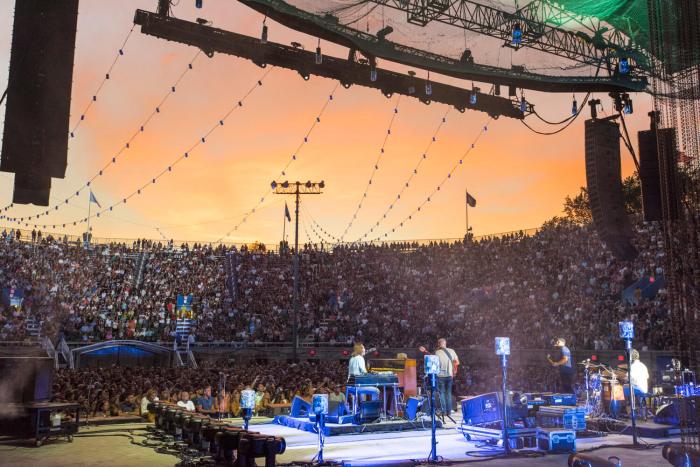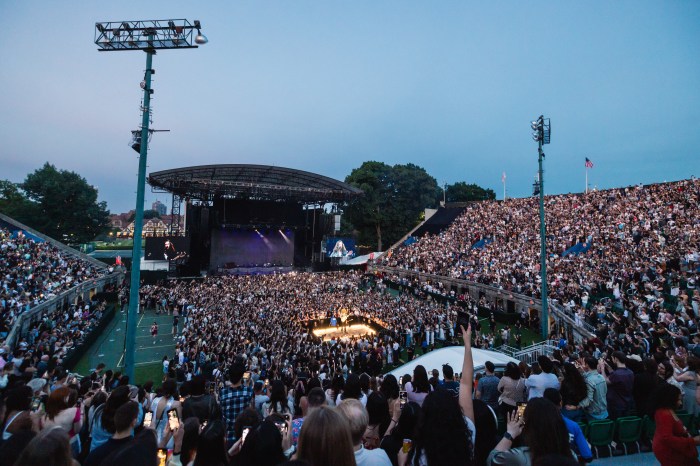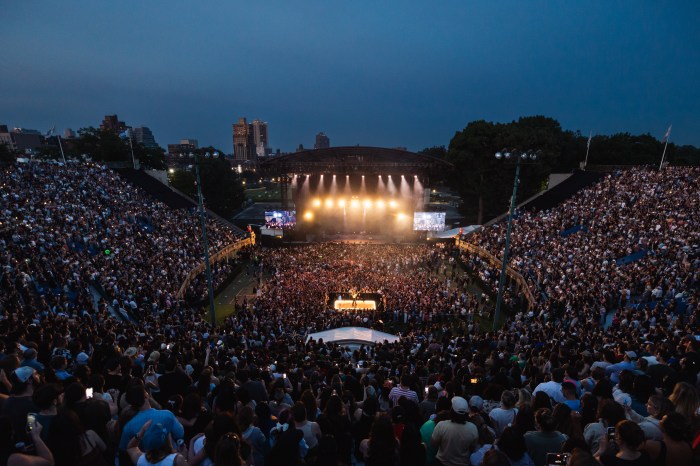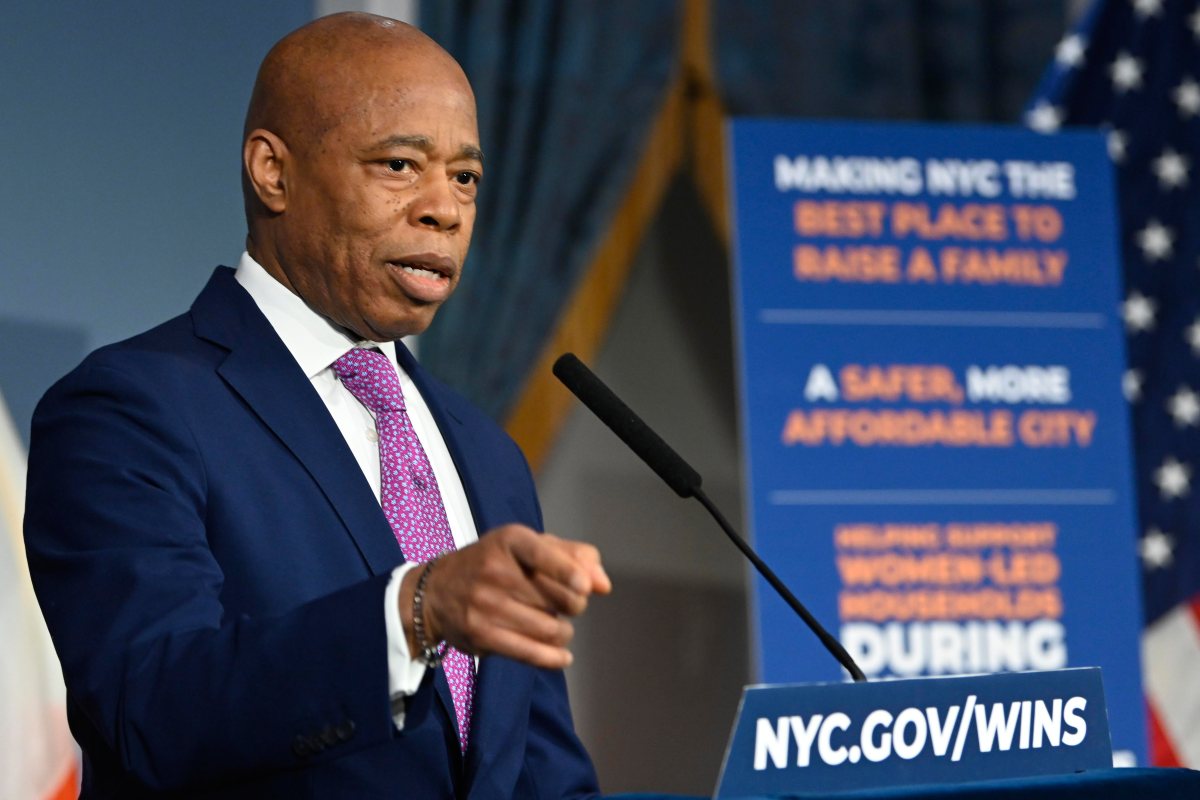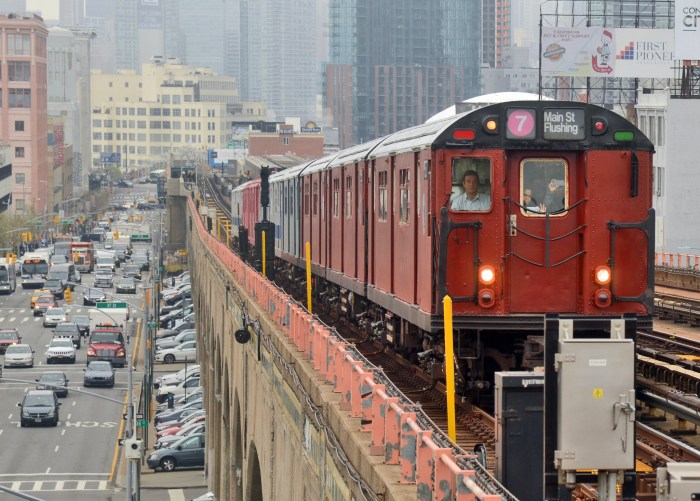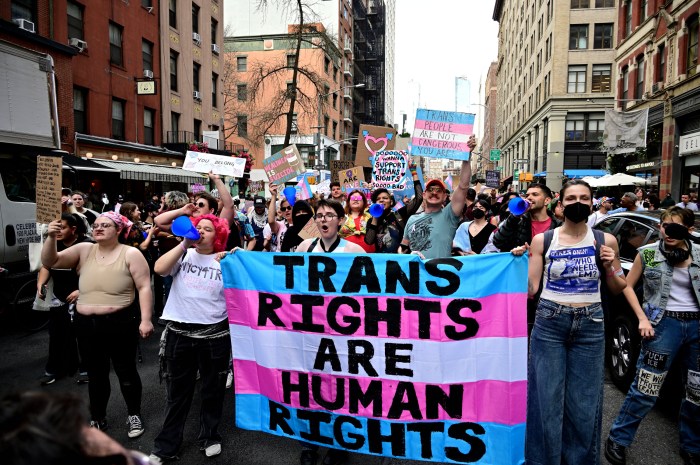Queens Borough President Donovan Richards has penned a letter to Mayor Eric Adams urging him to use all available resources to ensure that Forest Hills Stadium’s 2025 summer concert season goes ahead as planned after a local homeowners group refused to grant access to the private streets surrounding the venue.
Richards, who also recently met with the mayor over the issue, penned the letter on March 28 after the NYPD declined to issue sound amplification permits for the venue’s summer event series, citing a decision by local residents group Forest Hills Garden Corps (FHGC) to deny the city access to a series of private roads surrounding the venue.
FHGC has been involved in a years-long legal dispute with West Side Tennis Club (WSTC), which operates and leases Forest Hills Stadium, and Tiebreaker Productions, which operates events at the venue.
On March 19, NYPD Inspector William Gallagher wrote in a letter addressed to WSTC that the NYPD could not issue sound amplification permits without FHGC’s permission to close the privately owned streets surrounding the stadium.
Richards has now waded into the long-standing dispute, calling on the mayor to reconsider the city’s decision not to issue sound permits for the 2025 season and “pursue alternative solutions” that would allow Forest Hills Stadium to hold event this summer as planned.
Richards wrote that it would be “shortsighted and destructive” to allow a small number of “frustrated individuals” to shutter one of the city’s most iconic venues. He also noted that the wider Forest Hills community has been “almost universally supportive” of the stadium.
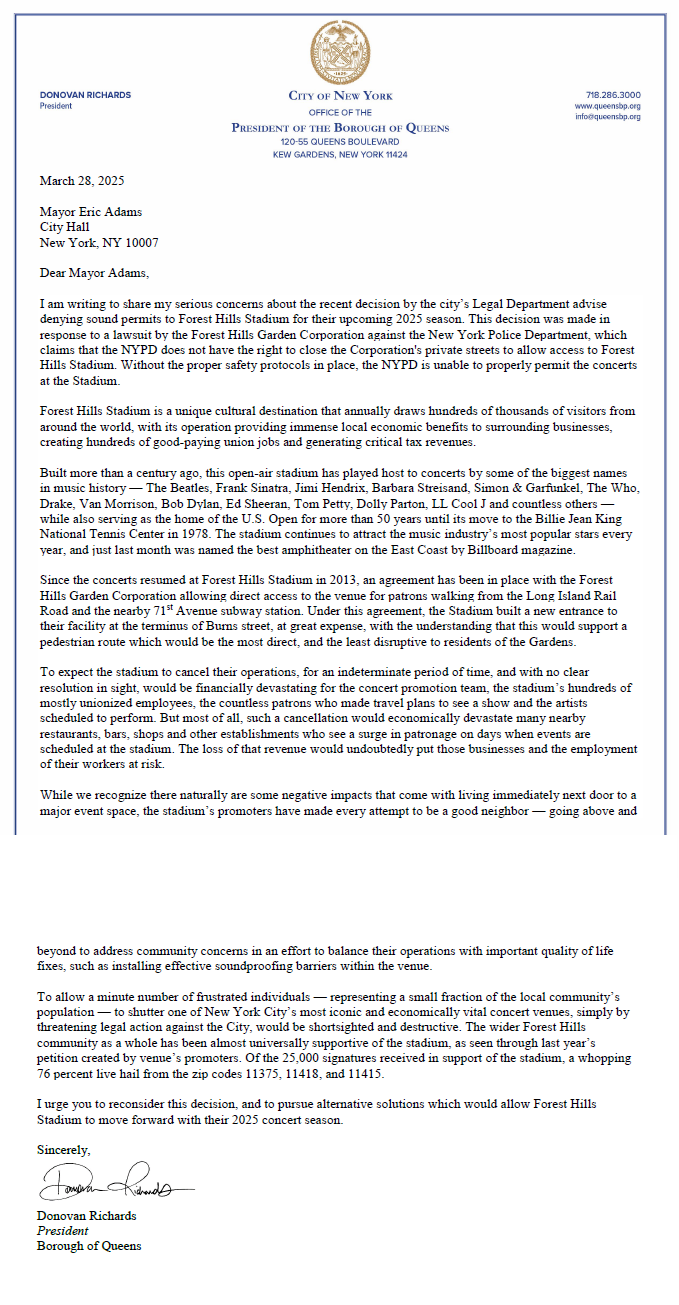
“While we recognize there naturally are some negative impacts that come with living immediately next door to a major event space, the stadium’s promoters have made every attempt to be a good neighbor — going above and beyond to address community concerns in an effort to balance their operations with important quality of life fixes, such as installing effective soundproofing barriers within the venue,” Richards wrote in the letter to Adams.
In a separate interview with QNS, Richards described the stadium as a “huge lifeline” for small businesses operating in the vicinity of the venue. He added that the venue forms an important part of an effort to turn Queens into a cultural hub, stating that Queens residents should not have to leave the borough to find some of the best entertainment in the city.
“More importantly, during a time in this country where we see such division, music brings everyone together,” Richards said. “I witnessed that at the stadium – how you have people from all walks of life – and that’s needed more than ever during this period of time when the country is so divided.”
Richards added that it would be a “dereliction of duty” not to fight for events at the stadium because the venue employs hundreds of people during its summer concert series, while neighboring bars and restaurants see an increase of up to 40% during the summer season.
He praised WSTC and Tiebreaker for “coming to the table” and offering to reduce the number of concerts at the venue, with 13 concerts currently planned for the 2025 season after a record-breaking year saw 37 events take place at Forest Hills Stadium last year. Richards also pointed out that stadium operators have also invested significantly in soundproofing equipment to minimize the impact of concerts on local residents.
He urged FHGC to compromise and allow the concert season to go ahead as scheduled.
“This is bigger than you,” Richards said. “It’s just bigger than just one block, or bigger than just one development. This has regional impacts or unemployment.”
Richards also believes there are ways that the 2025 season can still go ahead even if FHGC refuses to allow access to the private streets surrounding the stadium. He said he plans to raise the issue with NYPD Commissioner Jessica Tisch on Monday and called on the city to “drive a hard bargain” with the local residents group.
“I think the city needs to come to the table and really drive a hard bargain or look at ways… if these are private streets, perhaps we need to entertain looking at ways to turn them from becoming private streets and turn them into public streets,” Richards said.
Billboard recently named Forest Hills Stadium the best amphitheater on the East Coast, and Richards believes the venue is one of several “economic drivers” helping to drive down unemployment in the borough alongside LaGuardia Airport, which was recently named the best airport in the country by Forbes, the NYCFC soccer stadium currently undergoing construction at Willets Point, and several other projects.
“We want people to get out of the airport and stay in a hotel in Queens, eat in Queens, get entertainment in Queens, and use our small businesses across Queens,” Richards said. “If you’re from Long Island, you shouldn’t want to go into Manhattan to pay the congestion pricing fee when everything is here.”
Richards urged the mayor to use “every tool in his toolbox” to ensure that Forest Hills Stadium continues to host concerts and events.
“By supporting the stadium, you’re supporting the small businesses in Forest Hills, many of whom are depending on foot traffic.”
Adams appeared to confirm his support for the stadium in a post on X last month, quoting the Billboard article naming the venue as the best amphitheater on the East Coast.
“Forest Hills Stadium in Queens is another example of how you can find entertainment ALL over our city — meaning more people supporting our outer borough small businesses,” Adams said in a post on Feb. 15. “Can’t wait to welcome even more artists and visitors to the world’s borough.”
In his letter to WSTC on March 19, NYPD Inspector Gallagher said he hopes both parties can“come together” and reach a solution so that the NYPD can resume issuing sound amplification permits for the venue.
FHGC said it is “grateful” to the NYPD for the decision, adding that the organization’s board is “united” in its desire to “resolve this situation so that concerts can proceed in a manner that respects the rights, safety, and well-being of the community.
“We remain committed to working with all stakeholders to find a balanced solution that addresses concert impacts while respecting our community,” FHGC President Anthony Orprisiu said in a statement.
However, WSTC officials stated at the time that they had not yet received any communication from the NYPD regarding its decision to deny sound amplification permits for the 2025 season, slated to begin on May 31. They also accused FHGC of being a vocal minority of NIMBY (Not in My Back Yard) residents attempting to roadblock a popular music series.
Akiva Shapiro, an attorney representing WSTC, described reports that the NYPD had declined sound amplification permits for the venue as “unfounded rumors” and said WSTC views the reports as “extremely troubling.”
“Just last month, Mayor Adams personally tweeted his support for the Stadium as a thriving cultural hub and a significant economic engine in Queens. Neither the Stadium’s owner nor operator have received any communication from the NYPD concerning sound permits, which have always been granted to the Stadium upon request, including as recently as this past October,” Shapiro said in a statement last week.
Because nothing has changed in the last five months, because the NYPD has not raised any concerns with the Stadium directly, and because the City would risk significant liability if it were to abruptly shut the Stadium down, we can only assume that no such final decision has been made.”


